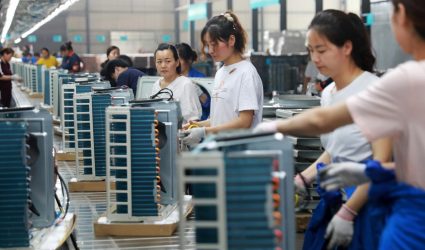China: Virus-hit businesses seek relief with ‘act of God’ clause

(Nikkei) – Nearly 100 Chinese businesses have been certified to invoke force majeure exemptions from contractual duties by a government trade council that deems the coronavirus outbreak as a qualifying disaster.
Under Chinese law, force majeure — or act of God — provisions are usually declared in the event of war, natural disaster, or intervention by state authorities. Commercial contracts generally contain such clauses, and if those conditions are met, a company is exempt from delivering goods or paying invoices, among other previously agreed-upon obligations.
When the coronavirus epidemic went into high gear at the end of last month, the China Council for the Promotion of International Trade started to issue force majeure certificates recognizing the outbreak as a triggering event.
The certificates themselves “are not free passes, but they can be used during negotiation between relevant parties,” said Masanori Kawai, an attorney for the Tokyo-based law firm Nagashima Ohno & Tsunematsu.
When an enterprise declares it cannot fulfill contractual obligations under force majeure provisions, the parties involved will first attempt to negotiate a settlement. Failing that, the dispute moves to legal proceedings, such as a court or an arbitration panel.
In the wake of the SARS outbreak in 2002-2003, Chinese courts lowered breach-of-contract fees by more than two-thirds. This time around, it is widely believed that the courts will generally side with domestic companies hit by the coronavirus.
Auto parts maker Huzhou Huida Machinery Manufacturing faces delays on deliveries to clients in Africa because local governments back home extended the official Lunar New Year holiday to at least Feb. 9, from the originally planned end date of Jan. 30.
With the lack of deliveries handicapping operations at client facilities, Huida could be asked to pay about 30 million yuan ($4.3 million) in damages. The company successfully applied for a force majeure certificate from the trade council, and the parts maker will negotiate smaller remuneration with client companies.
By issuing the certificates, the trade council “will try our best to protect such enterprises” by reducing “their economic losses to the minimum,” said Ding Guming, director of legal affairs with the Huzhou branch.
Some Japanese corporations appear to have encountered force majeure actions by their Chinese business partners. Liuzhou Glory Zinc Minmetchem received a certificate as it encounters delays in delivering goods to a Japanese chemical trader.
“Production lines are not operational as of Monday,” said a Glory Zinc representative. “Deliveries are likely to be made in March.”
At least 97 Chinese enterprises had received force majeure certificates from the council as of Monday. The industries cut across a wide spectrum, including steel, apparel, paper products and construction materials.
The list apparently includes the Chinese arms of foreign multinationals as well. With the list expected to grow much longer, the force majeure proceedings will spread to more Japanese companies.
Major Chinese groups are also invoking force majeure protections. CNOOC has cited the coronavirus as the reason to put off contractually obligated purchases of liquefied natural gas, according to state media reports.
A state-owned shipbuilder has apparently declared force majeure as well to renegotiate delivery times for vessels, with the move due in part to difficulty securing manpower.
Chinese authorities are scrambling to put together a package that will ease the impact of the coronavirus on the business sector and economy at large. The People’s Bank of China, the nation’s central bank, hinted at a rate cut this month, and is instructing banks against cutting back or recalling loans. Regional governments are likely to step up infrastructure investments.
Considering the force majeure certificates are part of the overall initiative to alleviate the outbreak’s repercussions, state actions and court judgments may tend to favor Chinese enterprises. International companies doing business in China could be pressed to make concessions on delivery dates and breach-of-contract penalties.

